Real estate professionals must consider all Fair Housing Act Laws because they are legally and ethically obligated to ensure their clients have equal opportunity access to housing. Failure to comply with fair housing laws can damage a real estate agent’s reputation and financial liability and cause a loss of business. Make sure you are well versed with the fair housing definition and regulations so you don’t put your license, clients, and business at risk.
Disclaimer: While this article provides basic guidance accompanied by research, you should always seek professional legal advice if you and/or your clients experience a violation of real estate fair housing laws.
What Is the Fair Housing Act?
The Fair Housing Act (FHA) is a United States federal law created as part of the Civil Rights Act of 1968. It was created to prohibit housing discrimination during the process of a sale, rental, or financing. The law applies to single-family homes, apartments, and condos, regardless of whether they are sold or rented. The law also applies to mortgage lending, insurance, and marketing advertisements for housing.

Protected classes (Source: Equal Rights Center)
The Fair Housing Act of 1974 and 1988 was amended to include additional groups of protected classes. Below are the protected classes determined by the Fair Housing Act as it stands today:
- Race
- Color
- National origin
- Religion
- Sex
- Familial status
- Disability
The FHA is a federally implemented law that acts as a baseline for states and local governments to create laws surrounding fair housing. For example, the New York City Human Rights law adds that you must not discriminate in housing based on actual or perceived race, any lawful source of income, or children residing in such space. In California, you cannot discriminate based on sexual orientation. Depending on the state, fair housing laws have expanded protected classes under the Federal Housing Administration (FHA) also to include:
- Gender, gender expression, and gender identity
- Citizenship status
- Partnership status
- Lawful occupation
- Ancestry
- Source of income
- Age
- Domestic violence victim status
- Genetic information
- Marital status
- Medical condition
- Sexual orientation
- Military or veteran status
- Primary language
- Criminal background
What Is Prohibited According to the Fair Housing Definition?
Real estate agents must understand that The Fair Housing Act and state-specific laws aim to protect their business and their clients against discrimination. The 2023 Fair Housing Trends Report released by the National Fair Housing Alliance said that in 2022, 33,007 fair housing complaints were received. This is the highest number of complaints ever reported in a single year and 5.74% higher than the previous year. Specifically, complaints based on source of income and domestic violence increased.
The federal Fair Housing Act in real estate prohibits discriminatory activities in all aspects of housing, although some are not always the real estate agent’s responsibility. Below are violations against protected classes that are prohibited according to the FHA for landlords, agents, and lenders:
Landlords/Property Owners | Real Estate Agents | Lenders |
|---|---|---|
|
|
|
However, there are certain exceptions to this law. The FHA does exempt owner-occupied single-family buildings with four or fewer units, sold and rented by the owner, and housing operated by religious organizations or private clubs with limited occupancy to its members. Also, the FHA prohibits discrimination against familial status or age and senior housing with age requirements of 55 or 62 years of age, and older communities participating in senior housing programs are exempt properties.
Fair Housing Act Enforcement
After learning the fair housing definition, agents must know how and who can enforce it. The Fair Housing Act empowers the U.S. Department of Justice (DOJ) to file a lawsuit against an individual or organization engaged in a “pattern or practice” of discrimination. The DOJ can also act if a group of people has been discriminated against in a way that raises a matter of “general public importance.” The U.S. attorney general can decide what constitutes a matter of “general public importance.”
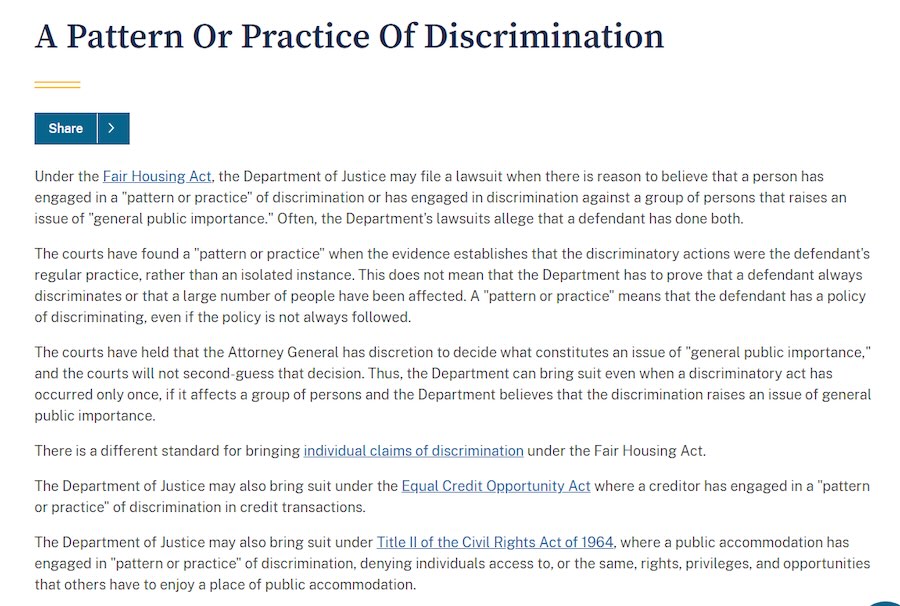
Excerpt from the Department of Justice (Source: DOJ)
The DOJ can sue under FHA for systematic mortgage discrimination or if a group’s denial of rights raises public concern. The DOJ can even file criminal charges when discrimination involves force or threats. Individuals who believe they have been discriminated against can file complaints with the U.S. Department of Housing and Urban Development (HUD) or initiate legal proceedings in federal or state courts. The DOJ may even provide legal representation to individuals based on HUD referrals.
When a discrimination complaint is filed, the HUD is responsible for conducting a comprehensive and timely investigation. If conciliation is unsuccessful, the HUD will determine whether federal laws have been violated. If there is reasonable cause to believe such laws have been violated, the HUD will issue a Charge of Discrimination. Within 30 days, the person who filed the complaint or the respondent may choose to have the charge heard in a HUD administrative law court or federal court.
Federal Court Trial vs Administrative Hearing
Discrimination complainants can opt for a federal court trial or an administrative hearing by the HUD. The former is represented by DOJ attorneys and heard by a judge or jury and may result in compensatory and punitive damages. The latter is represented by HUD attorneys and adjudicated by an administrative law judge, which may lead to civil penalties and compensatory (not punitive) damages. Both can issue written opinions and order injunctive relief, with the option to appeal to the U.S. Court of Appeals.
Special Considerations
Proving housing discrimination can be difficult, and collecting good evidence is helpful. Contact a local fair housing center or an attorney for guidance. Some states provide additional fair housing protections beyond federal laws.
For example, New York State Human Rights Law protects against discrimination based on various factors, including creed, national origin, sexual orientation, gender identity or expression, military status, age, and lawful source of income.
Fair Housing Violation Statistics
Expanding your knowledge of Fair Housing will give you a better understanding of how discrimination affects the real estate industry. Learn more about the statistics of Fair Housing Violations by referring to the data provided below. All these statistics are from the 2023 Fair Housing Trends Report released by the National Fair Housing Alliance.
- In 2022, Fair Housing Organizations reported 73.94% (24,404) of housing discrimination complaints, followed by FHAPs with 20.15% (6,652), HUD with 5.80% (1,915), and DOJ with only 0.11% (36).
- Out of the 17,580 complaints received, 53.26% were related to discrimination against a person with a disability.
- The second most reported type of housing discrimination was based on race, with 5,819 complaints, accounting for 17.63% of all complaints.
- Sex, including complaints based on sexual orientation or gender identity, was the third most frequent basis of discrimination, with 2,490 complaints (7.54% of all complaints).
- Familial status was the fourth most frequent basis of discrimination, with 2,147 complaints (6.50% of all complaints).
- National origin was the basis of 1,635 reported complaints, representing 4.95% of all complaints.
- Color was the basis of discrimination for 609 complaints, which accounts for 1.85% of all complaints, and religion was the basis of 353 complaints, which is 1.07% of all complaints nationwide.
5 Ways Real Estate Agents Can Comply & Protect Against Violations
When becoming a real estate agent, it’s crucial to thoroughly understand and comply with all national and state-specific fair housing laws. Violating the laws can lead to legal action and financial penalties that damage or end a real estate agent’s business. Therefore, real estate agents must understand how to protect themselves and their clients against FHA violations.
1. Know How to Answer Frequently Asked Client Questions
Real estate agents should be cautious when answering client questions about preferred neighborhood characteristics, location, and desired quality of living. Some of these questions may relate to protected characteristics and could potentially cause a violation of fair housing laws. Agents must focus on the properties themselves, have resources to direct clients to, and avoid making general assumptions when responding to their clients.
Below are some frequently asked client questions considered fair housing violation examples and proper responses that will help you avoid violating the FHA:
When looking for a home to purchase or rent, it’s common for clients to ask about neighborhood safety to protect their families and loved ones from potential robbery, assault, burglary, and other crimes. When a client asks a real estate agent whether a neighborhood is safe, the agent’s response would be subjective since it would be based entirely on an agent’s opinion.
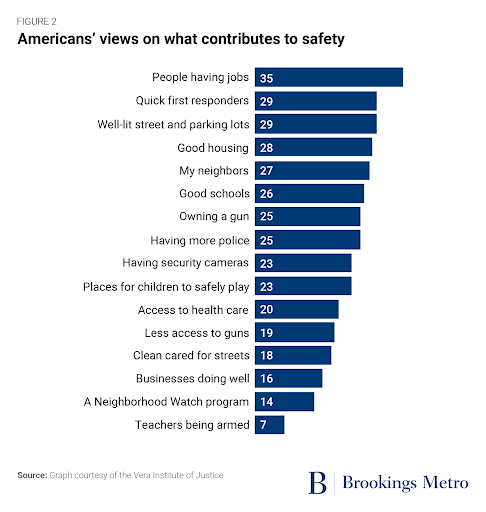
Graph of Americans’ view of safety (Source: Bookings)
Given that individuals view safety differently, agents should refrain from answering such safety questions with their personal thoughts or by providing neighborhood crime statistics since this could be an indirect reference to race or another protected class.
Alternative solutions:
- Encourage clients to find crime information through general resources like local police websites, sex offender registries, and government websites. Be mindful not to recommend specific websites, as those websites could be misleading or contribute to steering.
- Suggest that your clients visit the area with a friend or family member at different times of the day to observe the neighborhood.
- Clients can speak to those living in the area or online social media groups to get a feel for the neighborhood.
Clients may ask an agent if churches, mosques, or synagogues are nearby because they want to be close to their place of worship. However, clients asking this question may also be avoiding living near a specific group of people. Agents must offer equal services to all prospective buyers and renters regardless of race, religion, color, disability, national origin, sex, or familial status. Helping your clients find a home near their place of worship could be considered steering when agents suggest certain areas based on a protected class.
Alternative solutions:
- Direct clients to conduct their online search for the religious institutions they seek. Google Maps is a great resource for locating any business or address within a neighborhood.
- Drive around the neighborhood where you’re showing homes or have clients do so on their own so they can observe the surroundings and make notes if there are places of worship that interest them.
As neighborhood experts, real estate agents are commonly asked about the quality of school districts in certain areas. This question seems like a very innocent one coming from a parent or future parent, but this fair housing violation example could lead the agent down a slippery slope of potentially violating the Fair Housing Act.
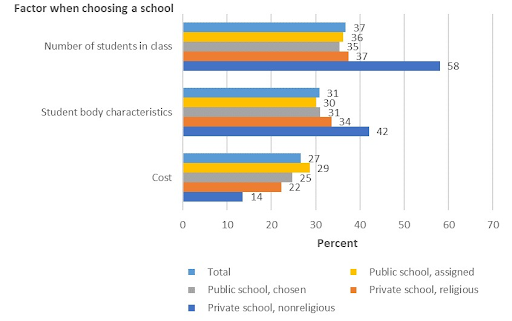
Graph of school factors important to parents (Source: NCES)
When a prospective client asks about good schools in a specific neighborhood, real estate agents must be careful in their response to avoid steering clients to or from a certain school or school district and, therefore, specific locations.
Alternative solutions:
- Tell clients to do their own research to make sure all their education needs and questions are met.
- Ask your client about their preferred school district location. Most parents will already have an idea of which school they want their child to attend. Performing a housing search for clients based on their desired location criteria does not violate fair housing laws.
Real estate agents should always avoid making assumptions about whether their clients have children, are married, or plan to expand their families. Familial status is a protected class by the Fair Housing Act, and saying anything related to their familial status can be discriminatory or deter their decision on housing.
Alternative solutions:
- During showings, real estate agents should never identify a room as good for a nursery, child’s room, or space for an au pair.
- Suggest your client check out the community website or social media boards to look for activities that would be best suited for them.
Clients questioning whether or not their service animal is accepted are usually in a rental property or multi-family unit building. An assistance animal is defined by the U.S. Department of Housing and Urban Development as an animal that works, provides assistance, or performs a task that benefits a person with a disability. Assistance animals may also provide emotional support that helps alleviate the effects of a person’s disability. Assistance animals are not considered pets.

Dog in service uniform (Source: Service Dogs for America)
Landlords and property owners may not refuse housing and must provide reasonable accommodations for a person with a disability, including allowing service animals. Agents must be aware that although a service animal is accepted and properly documented, a landlord has the right to deny housing based on other factors that have not been met, like income requirements. Housing cannot be denied based on the animal since that would violate fair housing laws.
Alternative solutions:
- When asked if a service animal is accepted in a particular property, agents may respond to their clients with a “yes” but inform clients that other factors may be based on the landlord (insurance, financial, etc.).
- Instruct clients to prepare their service animal documentation for the landlord or housing association.
- Know the service animal’s size, weight, age, and breed to provide proper information.
Under the Fair Housing Act, all disabilities, including physical and mental disabilities, are protected classes. Real estate professionals must make reasonable accommodations for individuals with disabilities to ensure equal access to housing. Landlords can do this by making modifications to a dwelling to allow better access. For example, landlords can install grab bars or ramps on a property to make it more easily accessible.
Real estate agents should be aware that landlords cannot always accommodate someone with a disability. According to the HUD, the request can be denied if the modifications or accommodations cause an undue financial and administrative burden on the property owner. An example would be asking to install an elevator in a building from the 1920s that does not have the capacity for it. Additionally, an owner can deny a request for a reasonable accommodation if the request was not made directly by the person with the disability.
Alternative solutions:
- All real estate advertising and marketing of properties must be inclusive. Do not include in your advertisement that a property is “within walking distance” from a neighborhood attraction.
- Avoid asking your clients, “What is your disability?” or answering the question, “Are there people with disabilities living in the building?” Instead, agents should inquire about your client’s particular needs or preferences for the property.
2. Review Your Advertising & Marketing Materials for Potential Fair Housing Violations
Real estate advertising and marketing are crucial for real estate agents to generate business leads. Forty-seven percent of homebuyers initiate online searches, so marketing activity is important to attract new clients. However, the language used in marketing material must also comply with fair housing laws.
Agents must avoid using words that can be discriminatory to a protected class in their property descriptions, websites, marketing materials, and real estate ads.
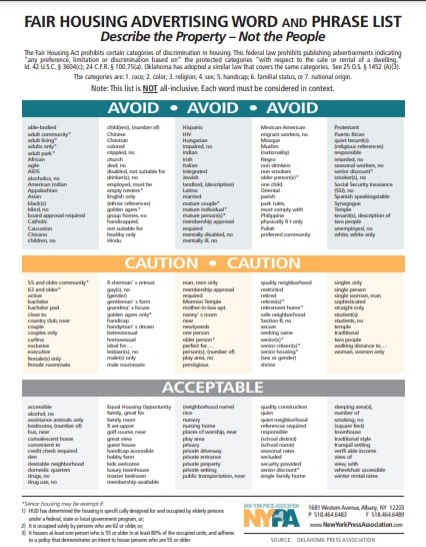
Fair housing advertising word and phrase list
(Source: Texas Press)
To eliminate real estate fair housing violations in advertising and marketing, agents should use inclusive language, avoid stereotypes and generalizations, and follow fair housing guidelines when creating materials. Agents should also be aware of the types of language and imagery perceived as discriminatory, such as words or phrases that imply preferences for a certain race, religion, sex, or familial status. Some examples of fair housing words to avoid and reasons for the fair housing violation:
Discriminatory Phrase | Fair Housing Violation Examples & Why | Alternative Phrasing |
|---|---|---|
“Lots of storage space for Christmas decorations” | Religion: Mention of Christmas/Christianity | “Lots of storage for decorations, furniture, and other knick-knacks” |
“Steps to the park” or “Walking distance to the library” | Disability: Walking/steps is not possible for everyone | “Three blocks from the park” or “.2 miles from the park” |
“Low crime statistics in the neighborhood” or “safe neighborhood” | Could violate all protected classes: Crime statistics are subjective opinion and steering | “Picturesque neighborhood” |
“Family-friendly” or “great for families” | Familial status: Cannot discriminate against those with or without families | “Large backyard,” “Parks nearby,” or “Extra guest room” |
“One-bedroom apartment, perfect for singles, non-drinkers welcome” | Age, marital status, familial status, and disability: Cannot discriminate against marital status; also, alcoholism is considered a disability | “Cozy one-bedroom apartment with space for full-size bed, dresser, and nightstand” |
“Master bedroom with en suite” | Race or sex: “Master” bedroom can be perceived as racist or sexist | “Primary bedroom with en suite” or “Main suite” |
“Last remodeled in 1990, a handyman’s dream” | Gender: Various genders can be handy, not specific to men | “Fixer-upper,” “Needs TLC,” “Handyperson’s dream” |
Small changes to your marketing language can ensure you are not violating real estate fair housing laws. Ultimately, you want to market the property in the best possible light by highlighting its amenities, features, and special details that will appeal to the appropriate target audience.

Listing automated marketing example (Source: Market Leader)
Agents who need assistance with marketing their listings can enlist the assistance of real estate marketing companies like Market Leader. Market Leader is one of the top providers of listing marketing automation. All new real estate listings will receive a property website, listing email, social media posts for Facebook and LinkedIn, and ready-to-print flyers and postcards. An expert real estate marketing team creates these materials, so you don’t have to worry about whether the content violates fair housing laws.
3. Be Confident With Real Estate Testers
The Fair Housing Testing Program is a program to help fight against housing discrimination by sending testers to pose as buyers and renters. Testers are similar to mystery shoppers who pose as interested parties and document their interactions with real estate agents or property managers to assess whether fair housing laws are being followed.
These testers will gather evidence of discriminatory practices by real estate agents or property managers. They will call to inquire about listings or even attend open houses and showings and ask leading questions to see if you violate any fair housing laws. As an agent, being confident and professional when interacting with real estate testers is essential to ensure compliance with the Fair Housing Act. Here are some tips to be extra prepared if you encounter a tester:
- Be familiar with fair housing laws and the protected characteristics that are covered.
- Understand what is allowed regarding advertising, showing, and renting or selling properties.
- Regularly check the HUD, DOJ, and your local state website for updates to real estate fair housing laws and regulations
- Attend training sessions at your local real estate board and brokerage
- Select continuing education hours that cover fair housing laws
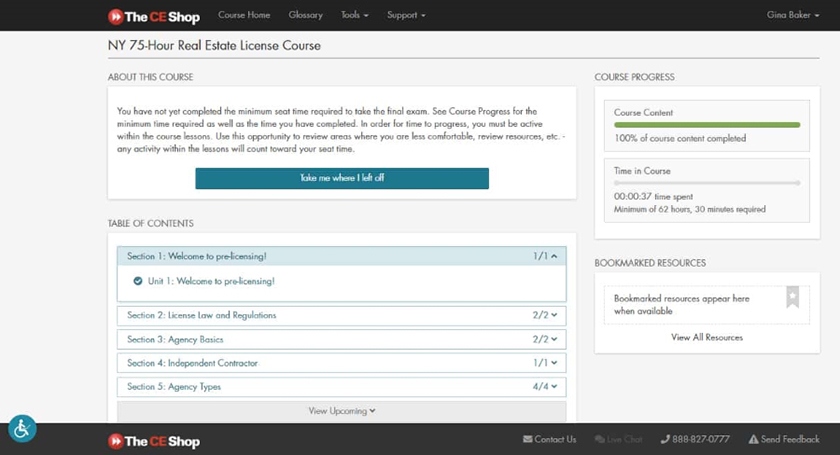
Main course dashboard (Source: The CE Shop)
Agents committed to staying up to date on fair housing laws can take continuing education courses at schools like The CE Shop. These courses are generally online and self-paced, so you can complete them on your own time. They also offer courses covering fair housing. These continuing education hours are required for license renewal anyway, so it’s a great way to maximize your time while strengthening your real estate knowledge.
4. Know Who to Contact When Discrimination Occurs
When fair housing discrimination occurs to you or your clients, real estate agents should know who to contact to report and address it. You can submit a claim with HUD online, via email, or through physical mail. Make sure to document the incident with as much detail as possible, including the date, time, parties involved, actions, etc.
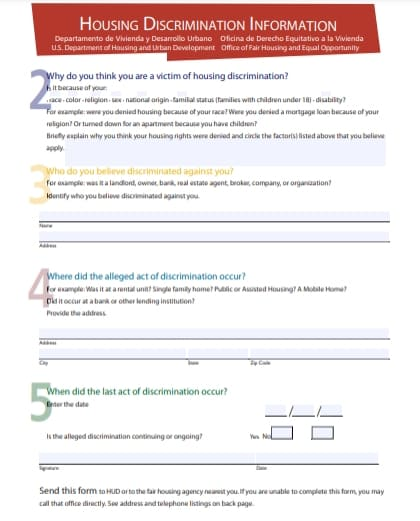
Housing discrimination form (Source: HUD)
Here are some options for who to contact if a violation occurs or if you have fair housing questions:
Agency | Website | Phone | Form |
|---|---|---|---|
U.S. Department of Housing and Urban Development (HUD) | Phone: 202-708-1112 TTY: 202-708-1455 | ||
National Fair Housing Alliance (NFHA) | Phone: 202-898-1661 Fax: 202-371-9744 TTY: 202-898-1670 |
5. Promote Equality
Real estate agents should treat all clients equally regardless of their protected status. They should avoid steering clients to particular neighborhoods or properties based on their protected status and refrain from using discriminatory language in their advertising or communications. One way to avoid unintentional discrimination in your real estate practice is to use standard screening criteria for all applicants, such as credit and criminal background checks, and give all your clients the same information packet.
Frequently Asked Questions (FAQs)
In a civil lawsuit, plaintiffs may be awarded compensatory damages to cover their attorney’s costs and fees as well as non-economic damages to compensate for emotional distress. Punitive damages may also be possible. The amount of civil penalties varies depending on the nature and frequency of the offense. The penalty starts at $16,000 for a first-time violation, but it can escalate up to $150,000 for cases that the Justice Department prosecutes.
The Fair Housing Act was a federal law that Congress passed shortly after the assassination of civil rights leader Rev. Dr. Martin Luther King. It was one of three significant pieces of legislation during the Civil Rights Movement.
The Fair Housing Act is in place to protect individuals who may face discrimination based on their disabilities, race, color, familial status, national origin, religion, and sex (including gender, gender identity, and sexual orientation).
Bottom Line
As a real estate agent, it’s important to understand the fair housing definition, take its laws seriously, and be proactive in your efforts to prevent discrimination and promote equal housing opportunities. Stay informed of any changes or updates to fair housing laws, and regularly review your practices to ensure compliance. By following these steps, you can help protect yourself against fair housing violations and ensure you provide all clients with equal housing opportunities.